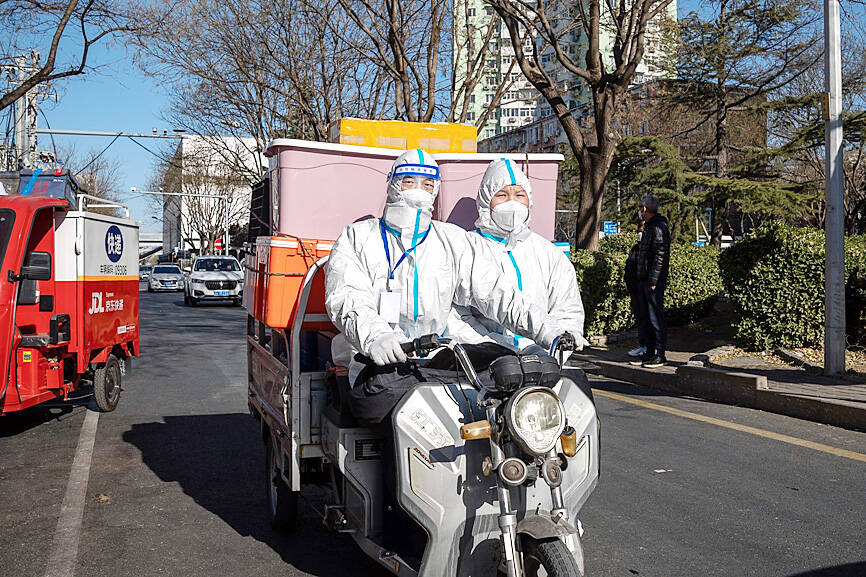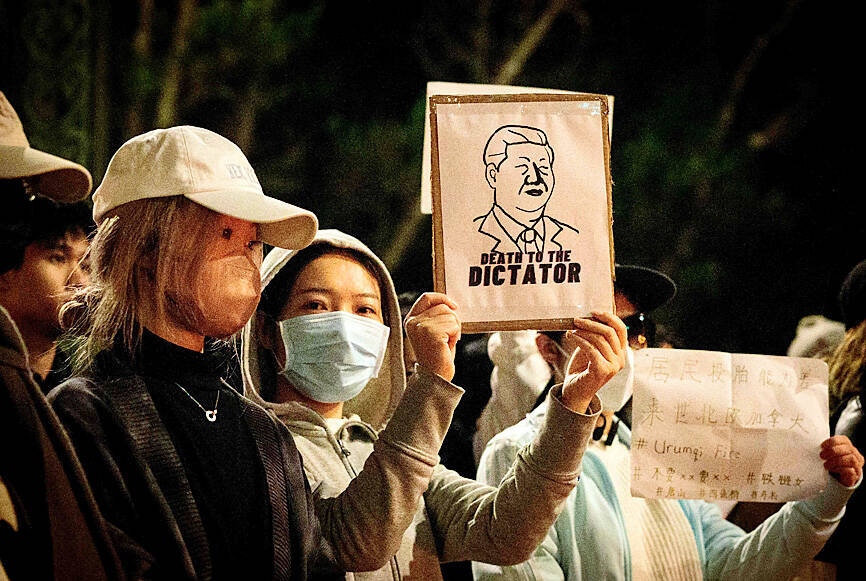Some Chinese cities yesterday eased some measures to curb the spread of COVID-19 as police patrolled the streets to head off protests while the Chinese Communist Party (CCP) prepared for the high-profile funeral of former Chinese president Jiang Zemin (江澤民).
Guangzhou in the south, Shijiazhuang in the north, Chengdu in the southwest and other major cities announced they were easing testing requirements and controls on movement. In some areas, markets and bus service reopened.
The announcements did not mention protests in Shanghai, Beijing and at least six other cities last weekend against the human cost of COVID-19 restrictions that confine millions of people to their homes.

Photo: Bloomberg
However, the timing and publicity suggested that Chinese President Xi Jinping’s (習近平) government is trying to mollify public anger after some protesters made the politically explosive demand that Xi resign.
With a heavy police presence, there was no indication of protests. Notes on social media complained that people were being stopped at random for police to check smartphones, possibly looking for prohibited apps such as Twitter, in what they said was a contravention of the Chinese constitution.
“I am especially afraid of becoming the ‘Xinjiang model’ and being searched on the excuse of walking around,” said a posting signed Qi Xiaojin on Sina Weibo, referring to the northwestern region where Uighur and other Muslim minorities are under intense surveillance.

Photo: AFP
Protesters have used Twitter and other foreign social media platforms to publicize protests while the CCP deletes videos and pictures from services within China.
Health authorities yesterday reported 36,061 new COVID-19 cases, including 31,911 without symptoms.
Meanwhile, Beijing was preparing for the funeral of Jiang, who was the CCP’s general-secretary until 2002 and president until the following year. The CCP announced he died on Wednesday in Shanghai of leukemia and multiple organ failure.
No foreign dignitaries are to be invited in line with Chinese tradition, the CCP announced.
It has yet to set a date for the funeral or announce how it might be affected by COVID-19 controls.
Xi’s government has promised to reduce the disruption of its “zero COVID-19” strategy by shortening quarantines and making other changes.
However, it says it would stick to restrictions that have repeatedly shut down schools and businesses, and suspended access to neighborhoods.
The protests began on Friday, after at least 10 people were killed in a fire in an apartment building in Urumqi, Xinjiang.
That prompted questions about whether firefighters or victims trying to escape were blocked by locked doors or other controls. Authorities denied that, but the deaths became a focus for public frustration.
The government says it is making restrictions more targeted and flexible, but a spike in infections since October has prompted local officials, who are threatened with the loss of their jobs if an outbreak occurs, to impose controls that some residents say are excessive and destructive.

People can preregister to receive their NT$10,000 (US$325) cash distributed from the central government on Nov. 5 after President William Lai (賴清德) yesterday signed the Special Budget for Strengthening Economic, Social and National Security Resilience, the Executive Yuan told a news conference last night. The special budget, passed by the Legislative Yuan on Friday last week with a cash handout budget of NT$236 billion, was officially submitted to the Executive Yuan and the Presidential Office yesterday afternoon. People can register through the official Web site at https://10000.gov.tw to have the funds deposited into their bank accounts, withdraw the funds at automated teller

PEACE AND STABILITY: Maintaining the cross-strait ‘status quo’ has long been the government’s position, the Ministry of Foreign Affairs said Taiwan is committed to maintaining the cross-strait “status quo” and seeks no escalation of tensions, the Ministry of Foreign Affairs (MOFA) said yesterday, rebutting a Time magazine opinion piece that described President William Lai (賴清德) as a “reckless leader.” The article, titled “The US Must Beware of Taiwan’s Reckless Leader,” was written by Lyle Goldstein, director of the Asia Program at the Washington-based Defense Priorities think tank. Goldstein wrote that Taiwan is “the world’s most dangerous flashpoint” amid ongoing conflicts in the Middle East and Russia’s invasion of Ukraine. He said that the situation in the Taiwan Strait has become less stable

CONCESSION: A Shin Kong official said that the firm was ‘willing to contribute’ to the nation, as the move would enable Nvidia Crop to build its headquarters in Taiwan Shin Kong Life Insurance Co (新光人壽) yesterday said it would relinquish land-use rights, or known as surface rights, for two plots in Taipei’s Beitou District (北投), paving the way for Nvidia Corp to expand its office footprint in Taiwan. The insurer said it made the decision “in the interest of the nation’s greater good” and would not seek compensation from taxpayers for potential future losses, calling the move a gesture to resolve a months-long impasse among the insurer, the Taipei City Government and the US chip giant. “The decision was made on the condition that the Taipei City Government reimburses the related

FRESH LOOK: A committee would gather expert and public input on the themes and visual motifs that would appear on the notes, the central bank governor said The central bank has launched a comprehensive redesign of New Taiwan dollar banknotes to enhance anti-counterfeiting measures, improve accessibility and align the bills with global sustainability standards, Governor Yang Chin-long (楊金龍) told a meeting of the legislature’s Finance Committee yesterday. The overhaul would affect all five denominations — NT$100, NT$200, NT$500, NT$1,000 and NT$2,000 notes — but not coins, Yang said. It would be the first major update to the banknotes in 24 years, as the current series, introduced in 2001, has remained in circulation amid rapid advances in printing technology and security standards. “Updating the notes is essential to safeguard the integrity